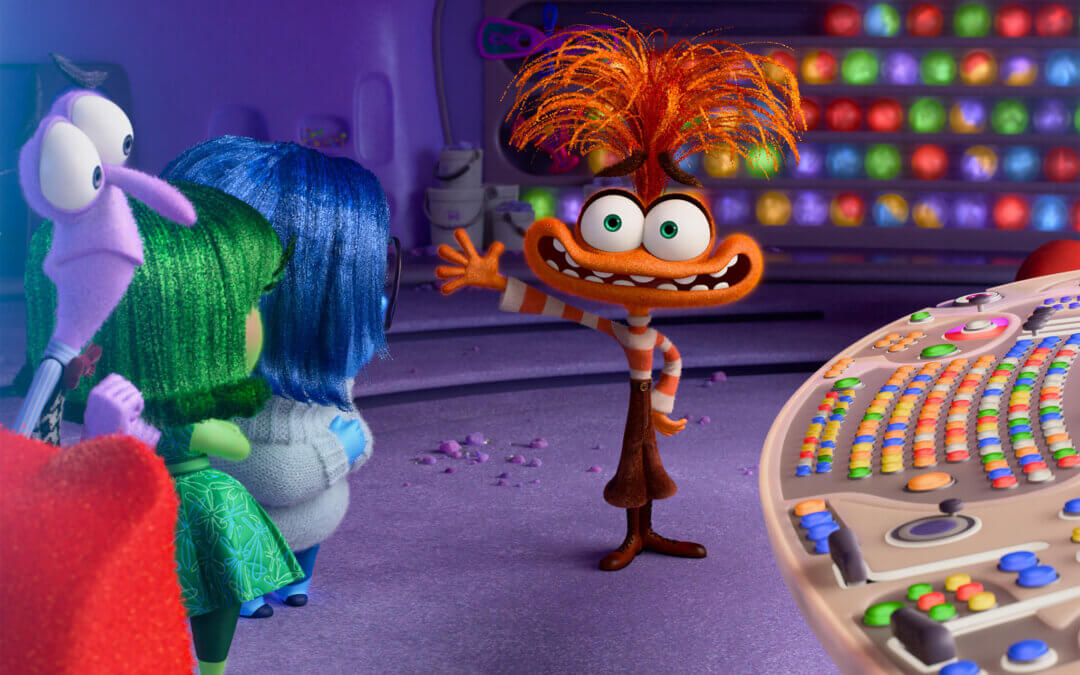*spoilers within the article*
I saw Inside Out 2 last night and as a children’s therapist it was incredible! As someone who has also gone through puberty and can look back at my own experience I have never felt more seen. The addition of the new emotions and the literal overnight shift of puberty was a great reflection of how puberty emotions onset in tweens and teens. The emotions working against each other is also a great representation of how that feels inside your brain when you are experiencing change or hardship. In this article I want to give my review as a children’s therapist but also give insight on what I think takeaways could be for parents who also have a teen or tween struggling or just experiencing emotions and change from puberty.
Anxiety was one of the new emotions that were introduced and boy was she funny but also a lot to digest. Anxiety came in quiet and seemingly ready to work with the team but then things took a quick turn for the worst. You see Riley change quickly and it really affects her friendships and her ability to cope with things that she was able to before. When looking at how anxiety affects our brains; anxiety was obsessive, controlling and unable to take instructions from others which really is incredibly accurate. The other emotions were shut down and suppressed which also can ring so true in teens. This representation of anxiety is really well done because even when teens are struggling with mild anxiety, it can really take over those emotions that they previously experienced, especially joy and what seems like they are hijacking their brain. When working with children who are struggling with anxiety we are looking at those connections to the sense of self that have taken over and looking at how untrue they are. They do feel so true in the moment so when supporting a teen going through puberty and struggling with these negative feelings about themselves, we can find ways to support them, find more play in their lives, and remind them of the positive things they know to be true about themselves. I think of Joy strumming the positive cognitions in Riley’s brain as us reminding our children of the good things they have learned about themselves. Anxiety was able to work together with the emotions and come together to help their human function which I think is a great representation of having a support system and learning how to cope with all of our emotions. I tell parents so often you being open, supportive, safe and consistent is the most important.
Joy taught us many lessons in the first movie but even more in the second movie. Joy comes to the brain like a loving motherly figure but she had full control until anxiety walked in. Joy had to understand the role that all of the emotions play and the role that good and bad memories play in Riley’s world. Joy was really attempting to protect Riley and keep her as safe as possible but those actions made her sense of self really fragile. Joy’s want for control was almost exactly the same control anxiety wanted, they both had to realize how important all the other emotions were. Joy’s lesson showed us that a sense of self can be created in all kinds of experience and experiencing all emotions makes us stronger and more resilient. As a children’s therapist this was really great to see how our sense of self is so important and having a system that is balanced and a safe home and safe people are really important. Allowing our kiddos to experience all emotions and difficult experiences is important to creation of a sense of self.
Continuing on the sense of self, the creation of a sense of self was so powerful. Hearing the positive cognitions was amazing (not going to lie, I shed a few tears when strumming them), then the creation of these anxious cognitions was hard to hear during the movie but the flexible sense of self was so powerful and created the version of Riley the emotions were looking for. The inclusion of all emotions and showing them working together is how we want to continue to see our children use all their emotions together. The parents really provided a safe place for Riley and her friends as did this. They showed they truly cared about her and were supportive and helpful in this sped up puberty process. Your teen or tween is in the process of creating her sense of self. The best thing you can provide is supportive and a safe place to express their emotions and hardships. Sometimes with the ups and downs of the changes in emotions holding space can be hard. Seeking support can look like finding a therapist for you or your kiddo, finding support within your support system, seeking social supports in the activities you are already involved in. Having that can help you see things in different light and create a system that is supportive and safe for the entire family unit.
In conclusion, having a movie like Inside Out 2, to explain and show how the emotions and the brain works in a digestible, visual way is so healthy and good for our children and parents. If you have not seen this movie, I apologize for the spoilers but please take your teens and tweens to see it. The characters are so relatable and it will build their knowledge of themselves and emotions that they experience everyday. I hope this breakdown helps start conversations within your homes and help you digest the movie and the themes that I found important to take away.

